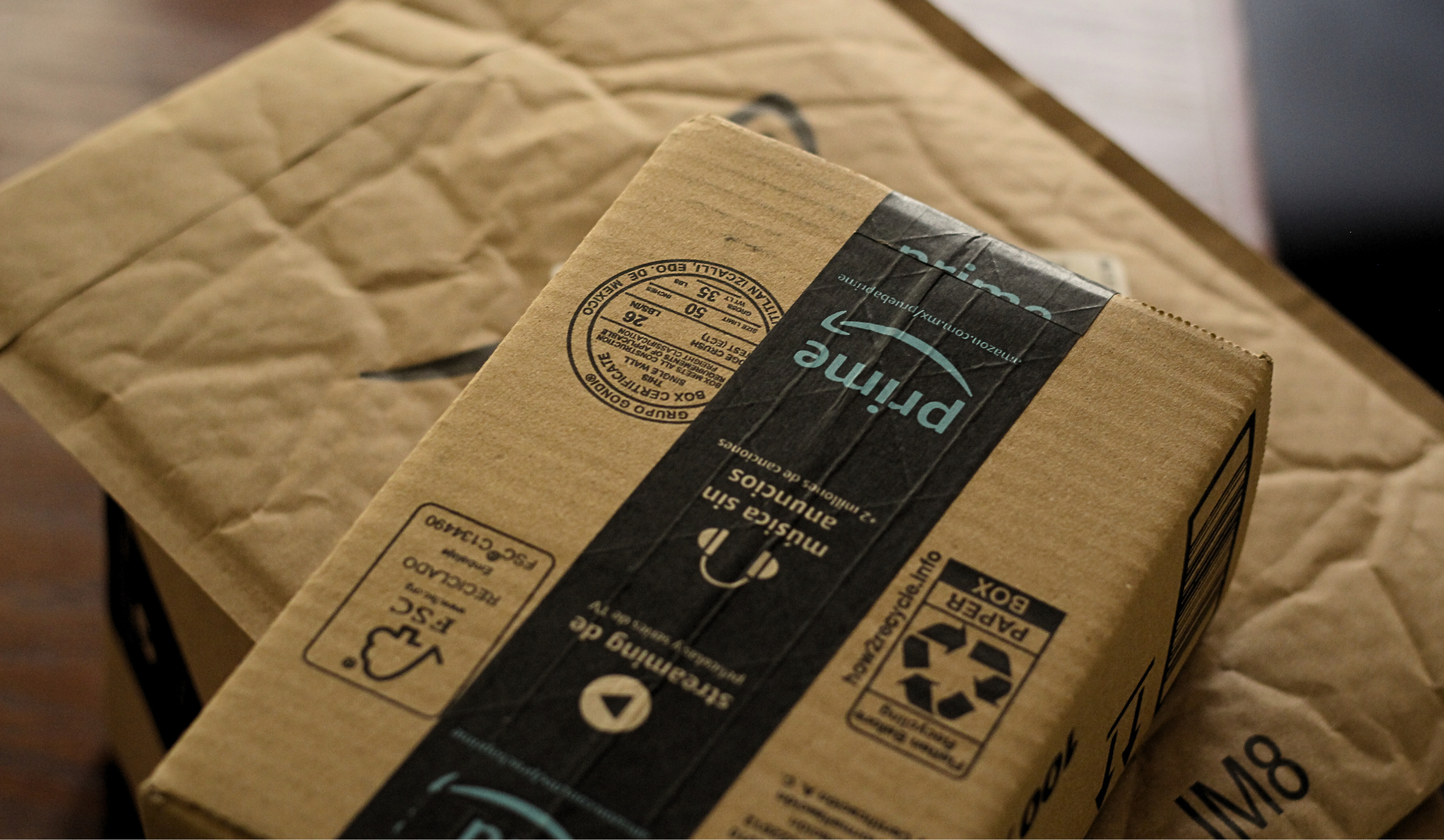
The Discreet Business Network behind Mexico’s Alimentación para el Bienestar
14 de August de 2025
Translated from Spanish
The second-largest grocery supplier of Mexico’s food security programs is a company surrounded by irregularities that has begun to raise concern among anti-corruption experts albeit not among government authorities. Founded in 2023, it was quickly invited by public officials to participate in closed-door procurement processes, despite not being localizable at its registered address and lacking prior experience or clear qualifications. From 2024-25, it has secured over 800 million MXN in public contracts (approximately 44 million USD).
By: Elizabeth Rosales / Empower Journalism
A newly created enterprise, untraceable at its registered address, and linked to a network of government contractors previously investigated by Mexico’s Federal Auditor (ASF) has become the second-largest supplier of groceries to the Rural Supply Program, a nationwide initiative of the Federal Government aimed at ensuring access to basic food stuffs for families in rural and semi-urban areas.
Incorporated in January 2023 in Jiutepec, Morelos, Comercializadora Familyduck, S.A. de C.V. was founded by two sisters, according to their social media profiles, one of whom previously worked in insurance sales and the other at a bus terminal. Then suddenly, they received no-bid public contracts totaling more than 833 million MXN (44.4 million USD).
In 2025 alone, this company has won 14.7% of all the public funds spent on the Rural Supply Program, more than twice that of the next largest supplier, Molinos Azteca, S.A. de C.V., better known as Maseca,1“Maseca,” Gruma, undated, www.gruma.com/es/nuestras-marcas/localiza-una-marca/maseca.aspx. a brand owned by Gruma, S.A.B. de C.V. (BMV:GRUMAB), which has received 7% of expenditures according to procurement information published on the ComprasMX website (as of July 2025).
Although neither of the two shareholders had previous experience as business owners or contractors, the registered holder of the Familyduck trademark, who is also the former sentimental partner of one of them, did: Enrique Magaña del Valle.
According to the Mexican Institute of Industrial Property (IMPI), Magaña also registered a brand for Todologos.com, S.A. de C.V., a company that has been a supplier of Diconsa, now Alimentación para el Bienestar, and was audited by the ASF along with Grupo Pelmu, S.A. de C.V. as part of the 2023 Public Audit.2“Informe de Auditoría,” ASF, 2023-24, www.asf.gob.mx/Trans/Informes/IR2023c/Documentos/Auditorias/2023_0125_a.pdf. Although the review does not name him, this latter company lists Yibrán Magaña del Valle, Enrique’s brother, as its legal representative.
In its audit, the ASF identified that both companies received a combined total of 338,145,600 MXN (18,042,418.78 USD) from Diconsa in 2023, and that a part of these public funds was transferred to three shareholders of other companies that also participated in the same procurement processes, even though, in principle, they were supposed to compete against each other. Additionally, the ASF found that Grupo Pelmu failed to provide proof of delivering a service for which it was paid 400,000 MXN (21,344 USD) by Diconsa.
Such practices are considered irregular because they may constitute serious administrative offenses, such as collusion, which occurs when two or more parties secretly collaborate to fix prices or divide the market. According to the now-defunct Federal Economic Competition Commission (COFECE), these cases must be monitored closely as they can harm public finances by leading to inflated prices, corruption, and inefficient use of public resources.3“Mayor competencia en contrataciones públicas,” COFECE, 28 February 2019, www.cofece.mx/wp-content/uploads/2021/02/art-ContPub-28feb2019.pdf.
The peculiarities of Familyduck and its ties to these companies, which were invited to participate in the same processes that Familyduck eventually won, have garnered the attention of anti-corruption experts, as they emerge in the wake of one of the most serious corruption scandals of the previous administration: the diversion of more than 15 billion pesos between 2018-22 at Segalmex and Diconsa, according to the ASF and media reports.4“El desfalco en Segalmex ya superó los $15 mil millones,” Mexicanos Contra la Corrupción, 20 February 2023, contralacorrupcion.mx/el-desfalco-en-segalmex-ya-supero-los-15-mil-millones.
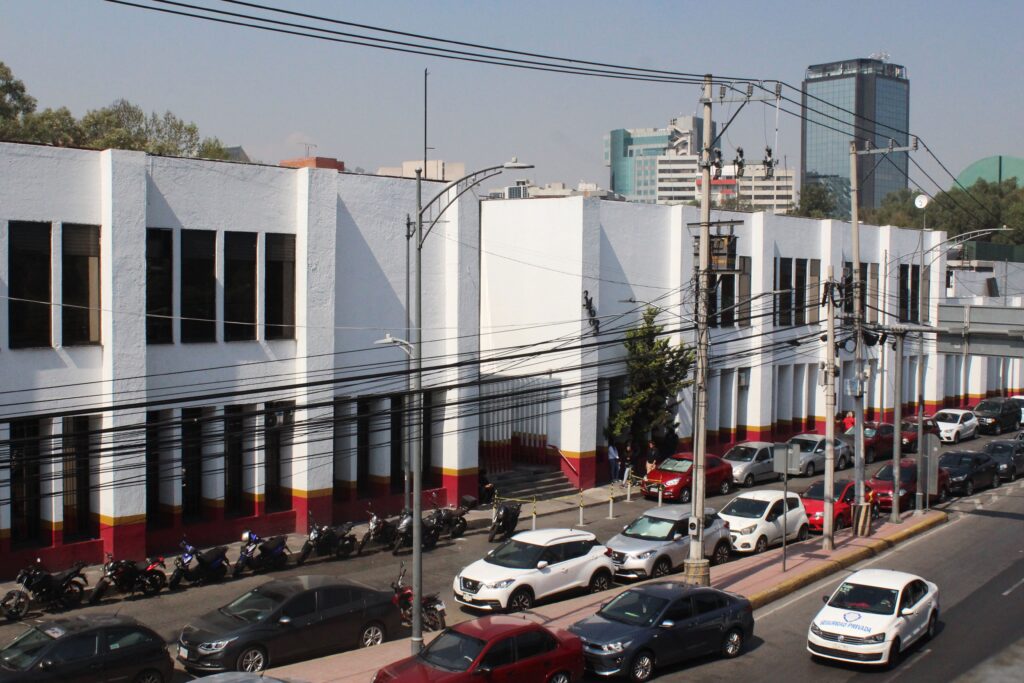
The amount embezzled from these entities, which oversaw food security programs, is equivalent to around 18 million basic food baskets that never reached the families they were intended for, according to data discussed in Mexico’s Chamber of Deputies in February 2025 during the review of the 2022 Public Account.5“El desfalco de Segalmex es la mayor traición a los que menos tienen: diputada Isabel Rodríguez,” Mexican Chamber of Deputies, 13 February 2025, sglinforme.diputados.gob.mx/index.php/grupo-parlamentario/-el-desfalco-de-segalmex-es-la-mayor-traici-n-a-los-que-menos-tienen-diputada-isabel-rodr-guez.
In Mexico, one in three households faces food insecurity, according to the 2024 National Survey of Household Income and Expenditures (ENIGH).6“1 de cada 3 hogares enfrentaron dificultades para comer por falta de recursos,” Expansión, 11 August 2025, politica.expansion.mx/mexico/2025/08/11/1-de-cada-3-hogares-enfrentaron-dificultades-para-comer-por-falta-de-recursos. That is why, when these types of efforts fail due to administrative mismanagement or corruption, “the consequences are devastating,” said Christian Torres, coordinator of the Conflict of Interest and Industry Interference area at the organization El Poder del Consumidor.
“These communities, already facing food insecurity, lacking access to clean water, and facing structural poverty and social exclusion, see their situation worsen when they are left unprotected against rising food prices, scarcity, or limited access. On top of that, it generates deep mistrust in public institutions,” said Torres.
It is in this context that Familyduck was created, a company with characteristics that the Secretariat of Good Governance and Anti-corruption itself recognizes as indicators of risk, according to a public official who provided general guidance for this article.
Familyduck, a supplier with no visible commercial presence
Number 222 Acalotenco Street is a warehouse in Azcapotzalco, in Mexico City, as well as the registered fiscal address of Comercializadora Familyduck, S.A. de C.V., according to the supplier registry of Alimentación para el Bienestar.
It is located in an industrial area known for its high crime rate,7“Estas son las 25 colonias más inseguras de Azcapotzalco donde reforzarán seguridad”, El Sol de México, 20 marzo 2024, oem.com.mx/la-prensa/policiaca/estas-son-las-25-colonias-mas-inseguras-de-azcapotzalco-donde-reforzaran-seguridad-13111955. where dozens of cargo trucks circulate daily, transporting goods such as clothing, footwear, and household items.
The building has blue metal doors and a narrow slit through which only the guard’s eyes are visible. He said he did not recognize Comercializadora Familyduck.
“Could you tell me the name of this business? Is it just one company renting here, or several?” the guard was asked.
“It’s called Warehouse 222 and there’s only one company, but it’s not the one you’re asking about,” he replied, then apologized for not being able to help.
Workers from other warehouses on the same street agreed with him. “It’s a warehouse, but not for groceries,” says one. “It’s for Chinese goods,” adds another.
None of them mentioned the company’s name, but a quick Google search leads to Tianmeishiye, S.A. de C.V., an import company with an active profile on Alibaba8“Tianmeishiye, S.A. de C.V.,” Alibaba, undated, mx29169730154wekd.trustpass.alibaba.com/company_profile.html?spm=a2700.shop_index.81.8.54bb74f2I0qXqK. and no apparent connection to the contractor working for Alimentación para el Bienestar.
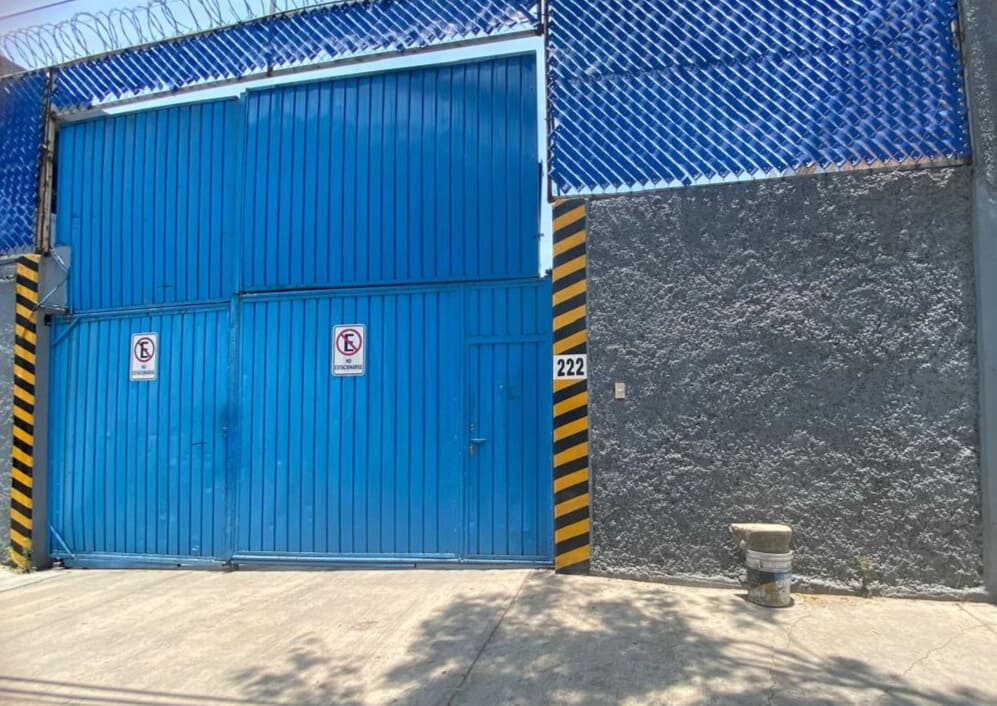
In contrast, Familyduck has no visible commercial footprint, neither physical nor digital. It has no website or social media presence, and no mentions in the media or other channels beyond Freedom of Information requests submitted for this article. The only public documents confirming its existence are its articles of incorporation in the Business Registration Management System (SIGER), the contracts signed with Alimentación para el Bienestar, and its trademark registration with the IMPI.
The registered logo is an illustration of a mother duck feeding her duckling, which, according to Google Images, matches an image from a children’s coloring book available on Pinterest.9“Farm Animal Ducks eating grain Coloring Pages | Printable Duck Coloring Page and Kids Activity sheet,” Pinterest, undated, es.pinterest.com/pin/403212972878409211.
Familyduck’s shareholders are two sisters, Fabiola Belén and Jessica Natali Sánchez Aguilar. Fabiola studied childcare at a technical school and worked selling life insurance, while Jessica was employed by a bus company in Morelos, according to their social media profiles, which were public until 2021.
Now, both sisters own a company that, between 2024-25, invoiced 833,365,705.41 MXN (44,465,854.53 USD) before taxes in public contracts with Alimentación para el Bienestar.
These findings were obtained after analyzing more than 23,000 public contracts awarded during that period for the Rural Supply Program, which is responsible for supplying the Tiendas del Bienestar, formerly known as Tiendas Diconsa. Although several of the agreements signed by Familyduck were labeled as “merchandise for resale,” the invoices we reviewed revealed purchases not intended for sale but rather for special programs supplying shelters and dining halls, such as those run by the National Institute of Indigenous Peoples (INPI) in states such as Puebla, Oaxaca, Guerrero, Chiapas, Sonora, and Sinaloa, among others.
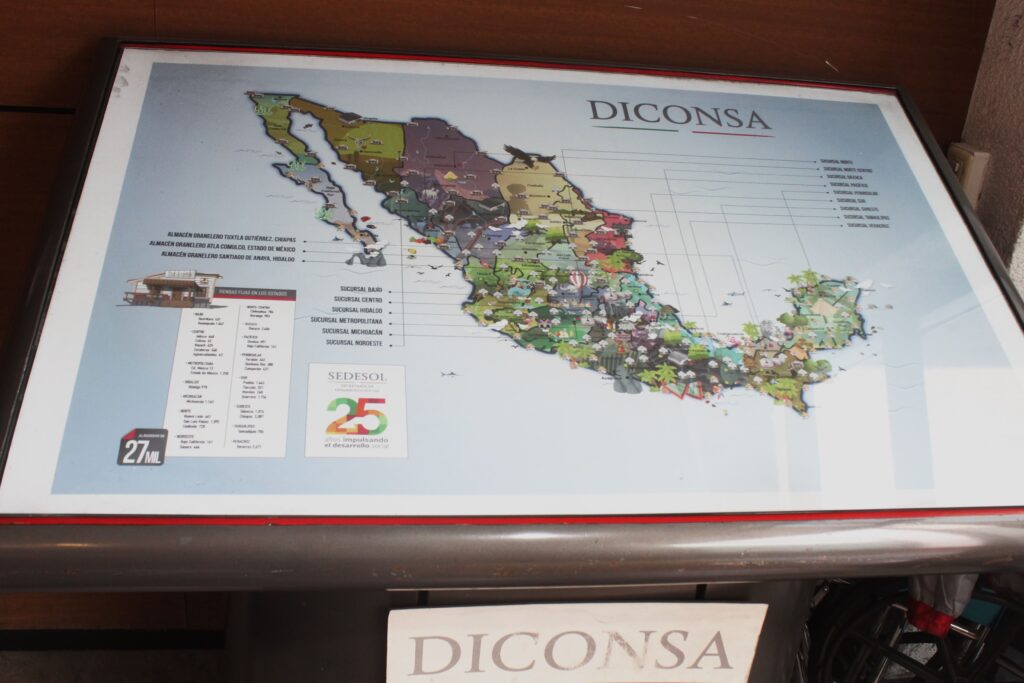
According to purchase invoices, Familyduck has sold everything from grocery items, such as rice, pasta, jam, jello, and cookies, to toilet paper, insecticides, hair conditioner, and oral hygiene kits.
The company’s lack of specialization, along with the fact that none of those purchases went through a bidding process, are two aspects that stand out to Vania Pérez Morales, a PhD in Political and Social Sciences and president of the National Anti-corruption System (SNA).
Pérez explains that public tenders are open procedures designed to ensure the best deal under equal conditions, since anyone who meets the requirements can participate. They also tend to be more closely monitored since any interested party can track the process.
“However, direct awards are more limited, and only the invited suppliers are made aware of them,” said the president of the SNA, who also clarified that this method is only justified in emergency situations, such as during COVID-19, or when a highly specialized product is needed that only a few suppliers can produce.
The fact that Familyduck operates as a trading company rather than as a producer or manufacturer is also something she sees as noteworthy. Trading companies act as intermediaries: they buy from other firms in order to resell. Normally, it would be cheaper to buy directly from producers, something that Alimentación para el Bienestar could do, since it has suppliers that produce the same items it purchases from Familyduck, such as cooking oils, flours, sugars, cereals, pasta, and detergents, among others.
From Pérez Morales’s perspective, initiatives such as the Rural Supply Program, which aim to benefit vulnerable communities, should prioritize ensuring the lowest possible prices. But that is not always the case.
Upon review of Familyduck’s invoices, for example, it was possible to identify that Alimentación para el Bienestar purchased 750 ml bottles of extra virgin olive oil from the company for 197 MXN each, equivalent to about 10.51 USD, and 504 gram boxes of salted crackers at 113.70 MXN, equivalent to approximately 6.07 USD, even though crackers of the same weight from the Gamesa brand sell in supermarkets for between 51 and 62 MXN, about 2.72 and 3.31 USD.
On top of that, Familyduck began receiving invitations from Diconsa the same year it was created, an outcome that, while not impossible, seems unlikely to Pérez. “How did you manage that when there are thousands of companies competing for contracts worth just a few thousand pesos?” she asked.
If we look only at the contracts awarded in 2025 under the new entity Alimentación para el Bienestar, Familyduck accounts for 14.7% of the budget spent through July for the Rural Supply Program. This percentage refers not to the number of contracts but to the total amount allocated, as shown in the following table.
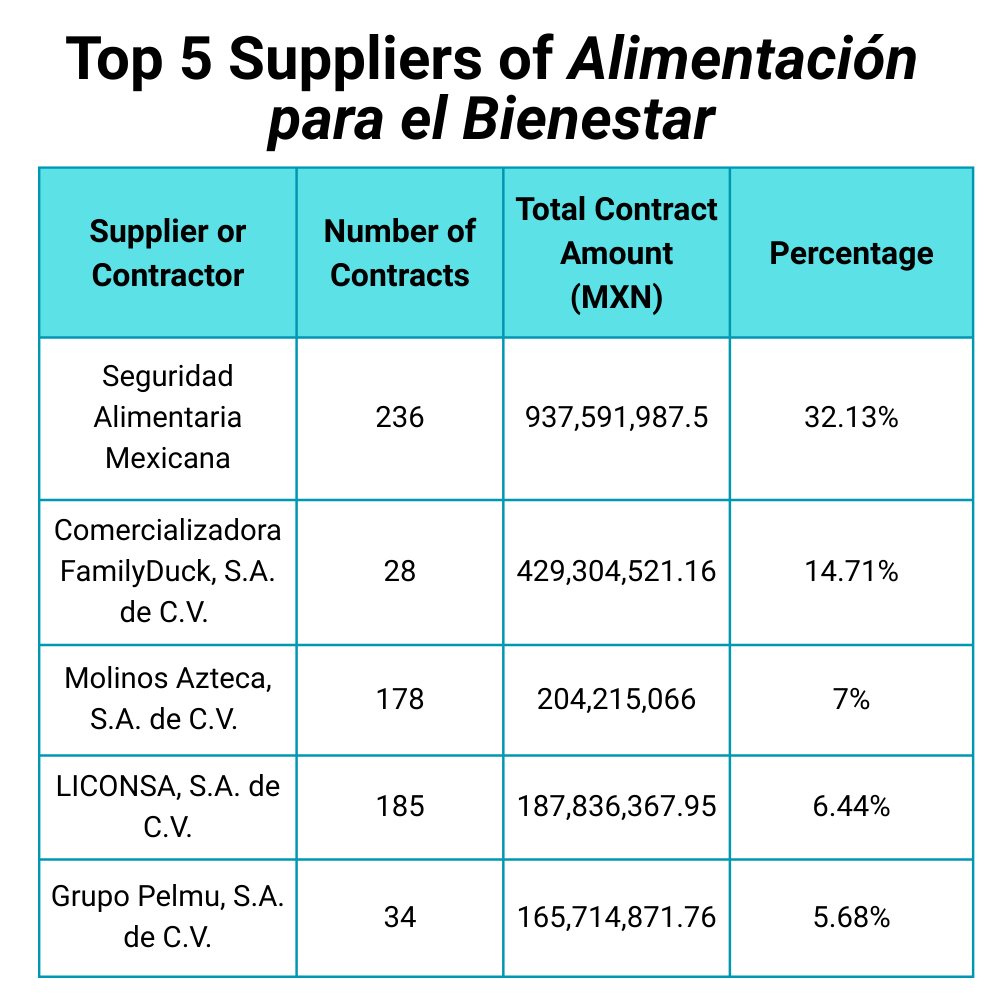
The only supplier with a larger share is the Federal Government itself, through Segalmex, which accounts for 32% of committed resources. In third place is Molinos Azteca, S.A. de C.V., known commercially as Maseca, with 7% of the budget. In contrast, most suppliers receive less than 1%, reflecting a high concentration of public spending in just a few cpmpanies.
For David Arellano Gault, a public administration and corruption expert and professor at the Center for Research and Teaching in Economics (CIDE), there other factors which, although not illegal, warrant attention since they can pose risks. These include personal relationships between contractors and public officials, as well as links between companies that, at least formally, compete with each other for contracts. In Familyduck’s case, both factors apply.
Todologos.com and Grupo Pelmu
Following the discovery of several irregularities in Diconsa’s Public Accounts from 2018-22, now operating as Alimentación para el Bienestar, the Federal Auditor (ASF) determined it was necessary to also review the use of public funds during 2023 to verify their efficient use.
To this end, it analyzed a sample equivalent to 31% of the federal public resources spent on procurement goods and services that year. Among the suppliers examined were Todologos.com, S.A. de C.V. and Grupo Pelmu, S.A. de C.V.
Todologos.com was incorporated in 2022 and, that same year, became a supplier to Diconsa, its main client, according to the 2023 Public Account. That year, the company supplied groceries and pharmacy items to the public agency.
Grupo Pelmu, in contrast, was incorporated in 2005 and provided a wide range of services, from groceries to loading and unloading support at Diconsa warehouses in Sinaloa, Sonora, Baja California Sur, and Baja California. It also handled vehicle maintenance for the agency’s administrative fleet.
As part of the forensic audit, both companies and Diconsa were asked to provide documentation proving contract fulfillment. This included attendance lists, photographic reports, or any other type of evidence showing that the goods and services had in fact been delivered.
This is how the ASF found that Grupo Pelmu failed to provide proof of compliance for contract number PSG-573-2022, for which it received 404,400 MXN, equivalent to 21,577.22 USD, for cargo handling services. According to interviews conducted by the ASF, the work at the warehouse was ultimately carried out by the community staff who had requested the service in the first place.
The agency also discovered that the company funneled nearly all of the public funds it received from Diconsa that year to other contractors.
In total, Grupo Pelmu used three bank accounts — at Santander, Banorte, and Inbursa — to receive 93,835,800 MXN, equivalent to 5,006,715.14 USD, and an additional 49,579,300 MXN, or 2,645,358.58 USD, from Todologos.com. Of that amount, 98.9% was transferred to third parties, including three unnamed shareholders who are also involved in other companies that took part in the same procurement processes.
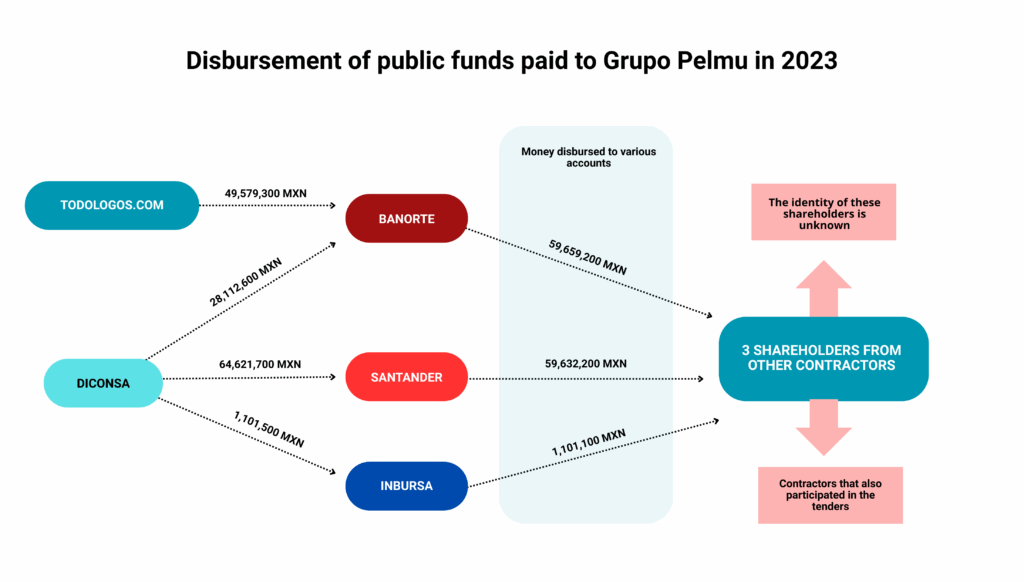
During an interview with the ASF, Todologos.com’s legal representative — whose identity is withheld but is referred to as female — stated that she only knew Grupo Pelmu “from what she had heard in business circles” and said she did not know why her company had transferred funds to it.
Despite this, the auditor’s report also indicates that the representative appointed as a witness for her interview someone who also holds the position of commissioner at Grupo Pelmu. The latter’s legal representative, however, did not appear for the interview requested by the ASF.
So far, in 2025, Todologos.com has not been awarded any contracts by Alimentación para el Bienestar, although it has been invited to participate in procurement processes. Grupo Pelmu, on the other hand, has received 13 contracts totaling 18,330,239.70 MXN, or 978,030.65 USD, despite the ASF’s findings.
“During the previous administration, we witnessed a major corruption scandal. The president himself had to acknowledge it and it’s very troubling that, despite this, irregular contracts are still being awarded. I’m not saying these people are corrupt, but all the signs point to corruption risks,” said Pérez Morales, president of the SNA, regarding the findings for this article.
The stain on Morena’s reputation
Among the corruption schemes in Segalmex and Diconsa identified by the ASF and organizations such as Mexicanos contra la Corrupción e Impunidad are payments for services that were never provided between 2018-22, goods that were not delivered, and the diversion of funds through shell companies, which exist only on paper and lack personnel, infrastructure, or the capacity to provide what they offer.
The case generated such a significant media impact that former President Andrés Manuel López Obrador himself referred to this case as “the stain” on his administration, one that the new government, led by Claudia Sheinbaum, has tried to put behind them this year by creating a new entity called Alimentación para el Bienestar, the result of a merger between Segalmex and Diconsa.
This new State-owned company is in charge of the Rural Supply Program and, therefore, is tasked with managing over 24,000 stores in the national supply network, which were re-branded from Tiendas Diconsa to Tiendas del Bienestar.
Another announced change was the creation of a new in-house brand aimed at supporting small-scale producers and offering high-quality products at affordable prices, starting with the transformation of items such as coffee, cacao, and honey through the Rural Supply Program.10“ACUERDO por el que se dan a conocer las Reglas de Operación del Programa de Abasto Rural a cargo de Diconsa, S.A. de C.V. (DICONSA) para el ejercicio fiscal 2025,” DOF, 24 January 2025, www.dof.gob.mx/nota_detalle.php?codigo=5747785&fecha=24/01/2025#gsc.tab=0.
For small producers, such as Arturo García Jiménez, a coffee grower from Atoyac, Guerrero, these programs could be good news if implemented properly. He is among those interested in supplying coffee to the Federal Government under the Bienestar brand. Until a few months ago, his concern was that the program might end up benefiting the usual large suppliers, such as Nestlé, rather than supporting small producers. After all, Nestlé had announced a one billion USD investment in Mexico in January.11“Presidenta Claudia Sheinbaum anuncia inversión de Nestlé de mil MDD como parte del Plan México,” Government of Mexico, 28 January 2025, www.gob.mx/presidencia/prensa/presidenta-claudia-sheinbaum-anuncia-inversion-de-nestle-de-mil-mdd-como-parte-del-plan-mexico?idiom=es#:~:text=Como%20parte%20del%20Plan%20M%C3%A9xico%2C%20la%20presidenta%20Claudia%20Sheinbaum%20Pardo,su%20producci%C3%B3n%20en%20el%20pa%C3%ADs.
This concern is understandable. Since 2017, and up to July 2025, the person who served as director of Agricultural Development at the Secretariat of Agriculture (SADER) had been Santiago Argüello, a public official who previously worked for intermediary companies linked to Nestlé, such as ECOM, and for Conservation International (CI), an ally of Starbucks.12“Explotación y opacidad: la realidad oculta del café mexicano en las cadenas de suministro de Nestlé y Starbucks,” Coffee Watch – Empower – Proyecto de Derechos Económicos, Sociales y Culturales (ProDESC), 14 February 2025, empowerllc.net/2025/02/14/explotacion-y-opacidad-la-realidad-oculta-del-cafe-mexicano-en-las-cadenas-de-suministro-de-nestle-y-starbucks.
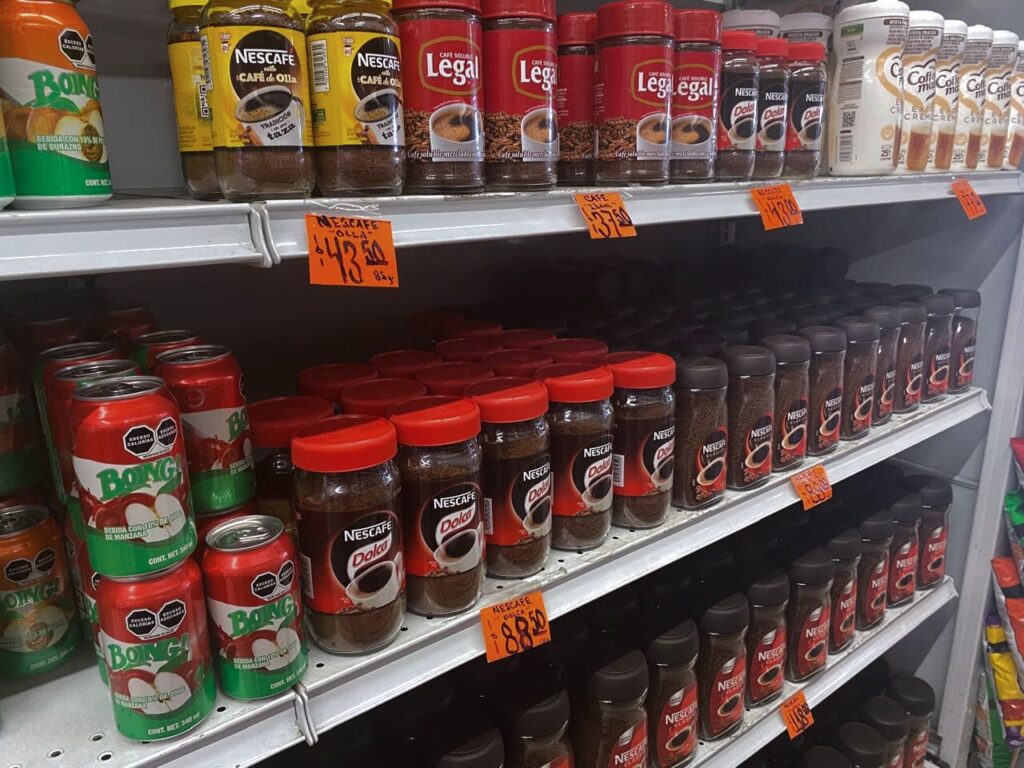
As a result of this case, in 2023 the Attorney General (FGR) issued arrest warrants for 22 individuals on organized crime charges, embezzlement, and money laundering.13“FGR consigue 22 órdenes de aprehensión por caso Segalmex,” Aristegui Noticias, 9 March 2023, aristeguinoticias.com/0903/mexico/fgr-consigue-22-ordenes-de-aprehension-por-caso-segalmex. Twelve of those implicated were public officials and at least three of them have already been arrested: Juan Rojas Fontes, former Budget Control manager;14“Los nuevos escándalos de corrupción de Segalmex entorpecen el plan de Sheinbaum de bajar el perfil de la paraestatal,” El País, 13 October 2024, elpais.com/mexico/2024-10-14/los-nuevos-escandalos-de-corrupcion-de-segalmex-entorpecen-el-plan-de-sheinbaum-de-bajar-el-perfil-de-la-paraestatal.html. René Gavira Segreste, former director of Administration and Finance;15“Detenido René Gavira Segreste, uno de los arquitectos del multimillonario desfalco en Segalmex,” El País, 7 December 2023, elpais.com/mexico/2023-12-07/detenido-rene-gavira-segreste-uno-de-los-arquitectos-del-multimillonario-desfalco-en-segalmex.html. and Hugo Buentello Carbonell, former deputy director of Operations.16“Detienen a Hugo Buentello, ex subdirector de Operaciones de Segalmex,” La Jornada, 17 April 2025, www.jornada.com.mx/noticia/2025/04/17/politica/detienen-a-hugo-buentello-ex-subdirector-de-operaciones-de-segalmex.
Among the names that several media outlets have identified as alleged perpetrators of the Segalmex embezzlement — who are also reportedly subject to arrest warrants — are other former officials about whom there has been no recent news: Oliverio Pérez Santoyo, former manager of the Guaranteed Prices Program, and Alejandro de Jesús Kuri Olivera, former manager of Material Resources and General Services, who had a close enough relationship with the Magaña del Valle family to invite them to his wedding in 2019.
In 2019, Kuri Olivera married another former Segalmex official, Zayra Lina Millán Tirado.
They met at work, according to a two-page society feature published in Diario de Morelos,17“Zayra Millán y Alejandro Kuri se casaron frente al lago de Tequesquitengo,” Diario de Morelos, 14 April 2019, www.diariodemorelos.com/noticias/edicionImpresa/Virtual/2019/04_Abril/Edi_14-04-2019/Encuentros/index.php?page=1. which also included photographs from the ceremony held by the lake in Tequesquitengo, Morelos. Among those pictured were family members, former colleagues of the couple, and nearly the entire Magaña del Valle family, except for Enrique.

Familyduck and Todologos.com did not exist when Kuri was a public official and, in the case of Grupo Pelmu, its registration as a government contractor occurred a year after he left Segalmex. Anti-corruption experts note that this connection, on its own, is a weak link; however, they agree that it is the sum of the characteristics observed in Familyduck, both individually and as part of a broader pattern, that warrants attention.
“Studies about corruption networks are built this way, out of clues. You have to connect the dots and it’s the sum of those dots, or their relationships, that raises suspicion,” said David Arellano Gault, a scholar at CIDE.
“In the case of Familyduck, it’s not just that it can’t be located at its registered address, or that it sells overpriced products, or its links to other companies it competes with for contracts, or that it has received nearly 15% of the budget allocated to the Rural Supply Program while most companies barely reach 1%. It’s the combination of all those factors.”
But beyond this specific case, Vania Pérez, of the SNA, warns of a deeper problem in public procurement: the risky practices that facilitated the multi-million peso diversion of funds in Segalmex and Diconsa, such as the unjustified use of no-bid contracts, or the hiring of newly created companies or those with conflicts of interest, which are still being repeated.
“We see it happen over and over again, and they’re not good practices, whether or not they’re formally classified as corruption. It’s essential to ensure they don’t happen again, because it’s the public who ends up paying the price and, in cases like this one of food distribution meant for the most vulnerable, the risk is even higher.”
For this article, we attempted to contact each of the individuals and companies mentioned, both via e-mail and the phone numbers listed in the Alimentación para el Bienestar supplier registry and in their filings with IMPI, as well as through personal social media accounts. In the case of Enrique Magaña del Valle, a phone number was even provided specifically for him to respond to this story. However, no one replied before the publication of this article.
1 “Maseca,” Gruma, undated, www.gruma.com/es/nuestras-marcas/localiza-una-marca/maseca.aspx.
2 “Informe de Auditoría,” ASF, 2023-24, www.asf.gob.mx/Trans/Informes/IR2023c/Documentos/Auditorias/2023_0125_a.pdf.
3 “Mayor competencia en contrataciones públicas,” COFECE, 28 February 2019, www.cofece.mx/wp-content/uploads/2021/02/art-ContPub-28feb2019.pdf.
4 “El desfalco en Segalmex ya superó los $15 mil millones,” Mexicanos Contra la Corrupción, 20 February 2023, contralacorrupcion.mx/el-desfalco-en-segalmex-ya-supero-los-15-mil-millones.
5 “El desfalco de Segalmex es la mayor traición a los que menos tienen: diputada Isabel Rodríguez,” Mexican Chamber of Deputies, 13 February 2025, sglinforme.diputados.gob.mx/index.php/grupo-parlamentario/-el-desfalco-de-segalmex-es-la-mayor-traici-n-a-los-que-menos-tienen-diputada-isabel-rodr-guez.
6 “1 de cada 3 hogares enfrentaron dificultades para comer por falta de recursos,” Expansión, 11 August 2025, politica.expansion.mx/mexico/2025/08/11/1-de-cada-3-hogares-enfrentaron-dificultades-para-comer-por-falta-de-recursos.
7 “Estas son las 25 colonias más inseguras de Azcapotzalco donde reforzarán seguridad”, El Sol de México, 20 marzo 2024, oem.com.mx/la-prensa/policiaca/estas-son-las-25-colonias-mas-inseguras-de-azcapotzalco-donde-reforzaran-seguridad-13111955.
8 “Tianmeishiye, S.A. de C.V.,” Alibaba, undated, mx29169730154wekd.trustpass.alibaba.com/company_profile.html?spm=a2700.shop_index.81.8.54bb74f2I0qXqK.
9 “Farm Animal Ducks eating grain Coloring Pages | Printable Duck Coloring Page and Kids Activity sheet,” Pinterest, undated, es.pinterest.com/pin/403212972878409211.
10 “ACUERDO por el que se dan a conocer las Reglas de Operación del Programa de Abasto Rural a cargo de Diconsa, S.A. de C.V. (DICONSA) para el ejercicio fiscal 2025,” DOF, 24 January 2025, www.dof.gob.mx/nota_detalle.php?codigo=5747785&fecha=24/01/2025#gsc.tab=0.
11 “Presidenta Claudia Sheinbaum anuncia inversión de Nestlé de mil MDD como parte del Plan México,” Government of Mexico, 28 January 2025, www.gob.mx/presidencia/prensa/presidenta-claudia-sheinbaum-anuncia-inversion-de-nestle-de-mil-mdd-como-parte-del-plan-mexico?idiom=es#:~:text=Como%20parte%20del%20Plan%20M%C3%A9xico%2C%20la%20presidenta%20Claudia%20Sheinbaum%20Pardo,su%20producci%C3%B3n%20en%20el%20pa%C3%ADs.
12 “Explotación y opacidad: la realidad oculta del café mexicano en las cadenas de suministro de Nestlé y Starbucks,” Coffee Watch – Empower – Proyecto de Derechos Económicos, Sociales y Culturales (ProDESC), 14 February 2025, empowerllc.net/2025/02/14/explotacion-y-opacidad-la-realidad-oculta-del-cafe-mexicano-en-las-cadenas-de-suministro-de-nestle-y-starbucks.
13 “FGR consigue 22 órdenes de aprehensión por caso Segalmex,” Aristegui Noticias, 9 March 2023, aristeguinoticias.com/0903/mexico/fgr-consigue-22-ordenes-de-aprehension-por-caso-segalmex.
14 “Los nuevos escándalos de corrupción de Segalmex entorpecen el plan de Sheinbaum de bajar el perfil de la paraestatal,” El País, 13 October 2024, elpais.com/mexico/2024-10-14/los-nuevos-escandalos-de-corrupcion-de-segalmex-entorpecen-el-plan-de-sheinbaum-de-bajar-el-perfil-de-la-paraestatal.html.
15 “Detenido René Gavira Segreste, uno de los arquitectos del multimillonario desfalco en Segalmex,” El País, 7 December 2023, elpais.com/mexico/2023-12-07/detenido-rene-gavira-segreste-uno-de-los-arquitectos-del-multimillonario-desfalco-en-segalmex.html.
16 “Detienen a Hugo Buentello, ex subdirector de Operaciones de Segalmex,” La Jornada, 17 April 2025, www.jornada.com.mx/noticia/2025/04/17/politica/detienen-a-hugo-buentello-ex-subdirector-de-operaciones-de-segalmex.
17 “Zayra Millán y Alejandro Kuri se casaron frente al lago de Tequesquitengo,” Diario de Morelos, 14 April 2019, www.diariodemorelos.com/noticias/edicionImpresa/Virtual/2019/04_Abril/Edi_14-04-2019/Encuentros/index.php?page=1.


